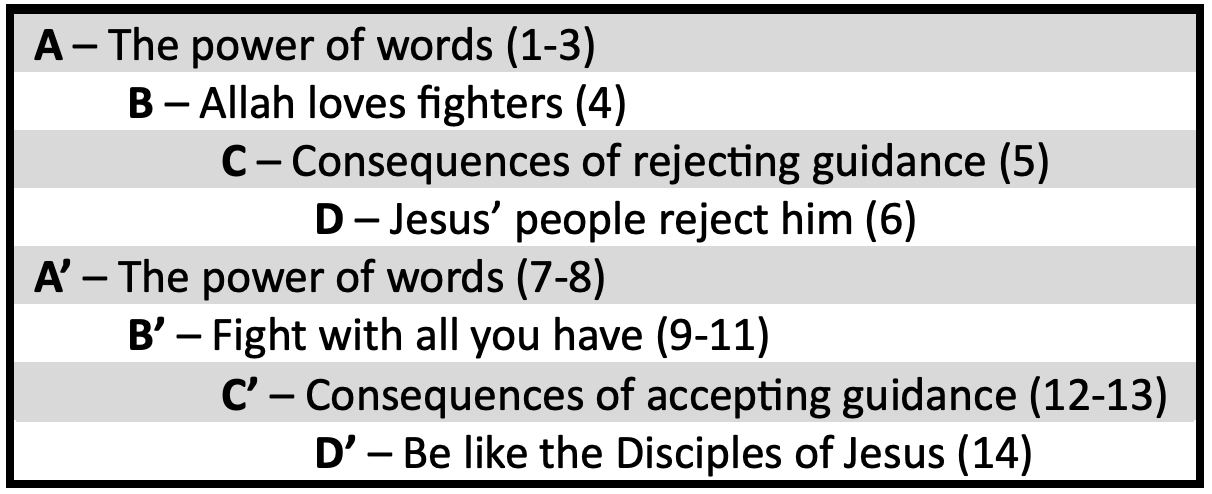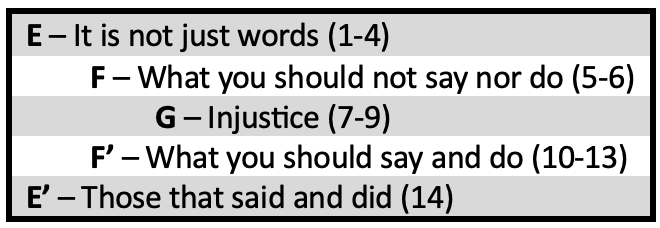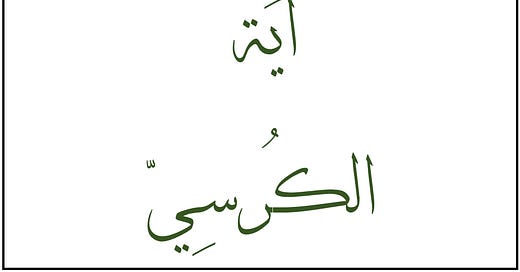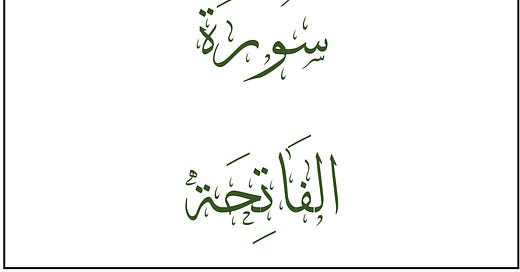

Discover more from Heavenly Order
Sūrat aṣ-Ṣaff (The Ranks) is the 61st sūrah in the Quran’s compiled order. It is believed to be a Madinan revelation, said to have come down around the time of the Battle of ‘Uḥud. The sūrah emphasizes the importance of showing faith through actions. Words are not enough. We must back those words with actions that prove our sincerity.
On the whole, it appears that this relatively short sūrah forms a parallel structure.
CONNECTIONS
[A]/[A’] – Both sections work to highlight the power inherent in the words we speak. The opening āyāt remind us that everything in the heavens and earth declare the perfection of Allah ﷻ. This is immediately followed by Allah ﷻ reprimanding believers, “Why do you say what you do not do? It is hated by Allah to say what you do not do.” In other words, what we say matters.
The āyāt in the middle of the sūrah teach us a similar lesson. “Who is more wrong than one who fabricates lies against Allah while called to Allah?” He ﷻ continues, “They want to extinguish the light of Allah with their mouths, but Allah will perfect His light, although the disbelievers dislike it.” In both examples, the disbeliever is trying to lie and counter the guidance sent by Allah ﷻ, but Allah ﷻ concludes this section saying, “It is He who sent His Messenger with guidance and the religion of truth to manifest it over all religion, although those who associate others with Allah dislike it.” In conclusion, their words will not affect Allah’s decree.
[B]/[B’] – Allah ﷻ declares His love for those who “fight in His way.” This is directly correlated to the related section where He adds, when speaking of virtues that can save one from Hell, “strive in the cause of Allah with your wealth and your lives.” Allah ﷻ loves those who fight for Him, and He especially rewards those who put their all into that fighting.
[C]/[C’] – Allah ﷻ gives the case study of the people of Moses when they rejected his messaging. In response, Allah ﷻ teaches us what happens, “And when they deviated, Allah caused their hearts to deviate. And Allah does not guide the defiantly disobedient people.”
In contrast, towards the end of the sūrah, we learn what happens if we accept faith. “He will forgive for you your sins and admit you to gardens beneath which rivers flow and pleasant dwellings in gardens of perpetual residence. That is the great triumph.”
[D]/[D’] – Both halves of the sūrah end with Jesus and his call to the Children of Israel. In the first case, his invitation is rejected, and they instead accuse him of performing magic. The final āyah records Jesus making a personal plea to a certain group from the Children of Israel. He asks, “Who are my supporters for Allah?” Instead of total rejection as he received in the earlier āyah, Jesus gets the reply of the disciples, "We are supporters of Allah." Allah ﷻ concludes the entire sūrah with a summary of both sections, “And a faction of the Children of Israel believed and a faction disbelieved. So, We supported those who believed against their enemy, and they became dominant.”
Alternatively, it has been argued that the sūrah fits into a ring structure as well.1
CONNECTIONS
[E]/[E’] – The beginning of the sūrah reprimands believers for “saying what you do not do.” Additionally, Allah ﷻ mentions His love of discipline, especially in the ranks of the believers during battle. The sūrah ends on a similar note. Believers are told to be like the disciples of Jesus, who were not only disciplined, but did what they said they would do.
[F]/[F’] – The next section gives two case studies of nations which failed to enact the lessons of the previous paired sections. The nation of Moses committed the crime of doing what they did not say. They professed faith to Moses, but betrayed that faith through their actions against him. The nation of Jesus failed when they openly expressed their feelings (“this is clear magic”) and rejected Jesus’ signs. The complementing section gives the opposite example. The nation of the Messenger ﷺ is told how to enact faith appropriately through the proper balance of speech (their declaration of faith) and action (fighting in the cause of Allah ﷻ(.
[G] – The sūrah centers on the injustice of the disbelievers, whom Allah ﷻ ends every āyah calling them by a different attribute. They are “oppressors,” “disbelievers,” and “polytheists.” They make up lies and try to “extinguish the Light of Allah with their mouths,” but Allah ﷻ counters and lets us know that He always perfects His Light, no matter how much they hate it. In the end, their words will never overcome the actions of the Messenger ﷺ who came with “guidance and the religion of truth to manifest it over all religion.”
And Allah ﷻ knows best.
Kiradoh, S. [@suudkiradoh]. (2024, April). An illustration of an attempt to show the divine order & organization of Surah 61: The Row [Three images showcasing the organization of Sūrat aṣ-Ṣaff]. Instagram.
Subscribe to Heavenly Order
Exploring the Divine Structure and Coherence of the Quran. Join us as we dismantle the myth of the "disjointed" and "random" organization of Islam's Revealed Text.
















*جزاكم الله خيرا ،وبارك الله فيكم*💐